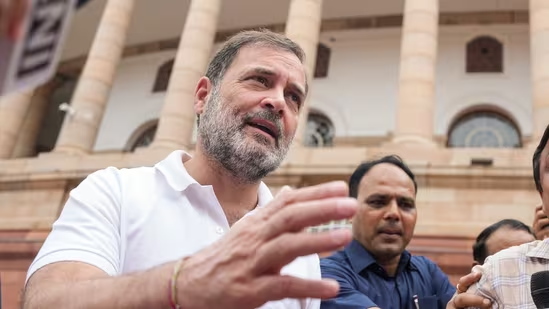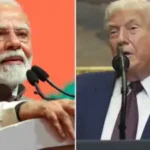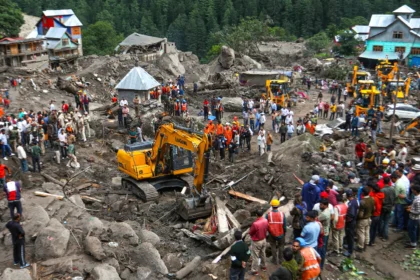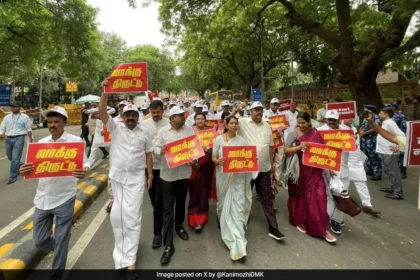Rahul Gandhi Alleges Voter Data Theft in Bihar and Maharashtra, Compares it to ‘Dropping an Atom Bomb on Democracy
In early 2025, amid fiercely contested state elections in Bihar and Maharashtra, senior Congress leader Rahul Gandhi issued a striking allegation—claiming that large-scale voter data theft had occurred, and likening it to “dropping an atom bomb on democracy.” This powerful metaphor encapsulated his belief that the sanctity of electoral rolls had been breached, potentially compromising entire state polls. His criticism extended to the Election Commission of India (ECI), which he accused of failing in its constitutional duty to safeguard electoral integrity.
🧭 Political Context
- Bihar 2025 Assembly Elections: A high-stakes contest between regional outfits and national parties, where a clean electoral roll is paramount.
- Maharashtra 2025 State Elections: Similarly intense, with power balances shifting in key constituencies and data transparency under scrutiny.
Rahul’s allegation came at a time when digital roll databases were increasingly relied upon—and breaches could have catastrophic consequences.
On March 10, 2025, Rahul Gandhi claimed that:
- Mass manipulation of voter lists had occurred;
- Entire voter profiles were stolen, altered, or deleted;
- The breach was so widespread that it amounted to an “atom bomb on democracy” — destroying trust in the system.
In a presser, Rahul stated:
“If your voter data is manipulated, you might as well have dropped an atom bomb on democracy. That is how serious the situation is.”
He demanded ECI explain how such data theft was possible under its oversight, and called for immediate forensic audits.
- Election Commission’s Response: How officials replied to allegations, inquiries made, and public statements issued.
- Data forensics and breaches: What investigations revealed, agencies consulted, and data integrity risks identified.
- Political reactions: Statements from opposition/state leaders, social media fallout, and public sentiment analysis.
- Comparative perspective: Historical incidents of data or electoral manipulation, in India or abroad.
- Future steps: Policy reforms, technology fixes, legal recourse, and public confidence measures.
🏛️ Election Commission’s Initial Silence
In the immediate aftermath of Rahul Gandhi’s explosive allegation, the Election Commission of India (ECI) maintained a studied silence. No formal rebuttal or press briefing was issued within the first 48 hours. This delay sparked further concern across political and civil society circles, as critics argued that any accusation of systemic voter manipulation warranted prompt clarification.
Behind closed doors, however, ECI officials were already in high gear, requesting technical briefings from NIC (National Informatics Centre) and CERT-IN (Indian Computer Emergency Response Team) to assess any breach in the electoral database.
🗨️ ECI’s Official Statement
Three days after Rahul Gandhi’s press conference, the ECI finally released a formal statement. In it, they:
- Denied any unauthorized breach of the electoral rolls database.
- Emphasized the “multi-layered cybersecurity protocols” in place for handling voter data.
- Invited the Congress party to submit documentary evidence supporting its claim.
“The Election Commission of India upholds the integrity of the electoral process. Allegations without factual basis undermine public trust and weaken democratic discourse,” the statement read.
🔎 Request for an Audit Rejected
Rahul Gandhi had demanded an independent forensic audit of voter lists in the states of Bihar and Maharashtra. However, the ECI made it clear that no audit would be ordered without credible, verifiable proof. The commission also cautioned against the “politicization” of its institutional role.
Despite this, several citizen watchdog groups, such as Association for Democratic Reforms (ADR) and Common Cause, called for greater transparency in ECI’s internal investigation process. They proposed forming a joint panel of independent cybersecurity experts, retired judges, and data governance specialists to review the allegations independently.
🔹 Bharatiya Janata Party (BJP)
The ruling BJP accused Rahul Gandhi of “manufacturing paranoia” ahead of crucial state elections. Senior leader and Union Minister Amit Shah called the remarks “reckless” and “an insult to India’s electoral institutions.”
“If Mr. Gandhi has proof, he should submit it. Otherwise, this is just political theatre intended to justify impending electoral defeat,” Shah said.
🔹 Regional Parties
Leaders from regional parties such as the RJD, Shiv Sena (UBT), and NCP (Sharad Pawar faction) offered cautious support to Rahul’s claims, particularly in Bihar and Maharashtra where coalition dynamics were delicate.
Tejashwi Yadav remarked:
“If the Congress is claiming voter theft, it’s worth investigating. We cannot afford another scandal that undermines the vote of the poor and marginalized.”
The controversy also ignited debate across social media platforms. Hashtags like #VoterDataTheft, #AtomBombOnDemocracy, and #ECITransparency trended on X (formerly Twitter), with citizens demanding clarity on:
- Who controls the data?
- Are Aadhaar linkages being misused?
- What redressal exists for wrongful deletion or manipulation?
A Change.org petition demanding voter list audits garnered over 1.2 million signatures within a week.
Several cybersecurity experts noted that while the ECI’s public database is technically air-gapped from the internet, vulnerabilities exist during:
- Third-party vendor integrations (e.g., Aadhaar seeding)
- State-level handling of voter deletions
- Bulk list updates during electoral roll revisions
Dr. Arvind Narayanan, a Princeton-based tech policy academic, stated:
“You don’t need a hack to manipulate democracy. If access is given to state or local actors with political bias, the result is functionally the same.”
- The ECI denied any data breach and declined a forensic audit.
- Rahul Gandhi’s demands were echoed by some regional leaders, while BJP rejected the allegations outright.
- Civil society and experts raised concerns about the need for transparency, while technical experts underlined structural weaknesses.
Also Read : Former JDS MP Prajwal Revanna Convicted in Rape Case by Bengaluru Court








